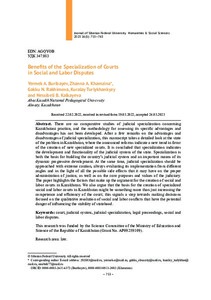Benefits of the Specialization of Courts in Social and Labor Disputes
Автор:
Buribayev, Yermek A.
Khamzina, Zhanna A.
Rakhimova, Gakku N.
Turlykhankyzy, Kuralay
Kalkayeva, Nessibeli B.
Бурибаев, Е. А.
Хамзина, Ж. А.
Рахимова, Г. Н.
Турлыханкызы, K.
Kaлкаева, Н. Б.
Дата:
2023-05Журнал:
Журнал Сибирского федерального университета. Гуманитарные науки 2023 16 (5). Journal of Siberian Federal University. Humanities & Social Sciences 2023 16(5)Аннотация:
There are no comparative studies of judicial specialization concerning Kazakhstani practice, and the methodology for assessing its specific advantages and disadvantages has not been developed. After a few remarks on the advantages and disadvantages of judicial specialization, this manuscript takes a detailed look at the state of the problem in Kazakhstan, where the announced reforms indicate a new trend in favor of the creation of new specialized courts. It is concluded that specialization indicates the development and functionality of the judicial system of the state. Specialization is both the basis for building the country’s judicial system and an important means of its dynamic progressive development. At the same time, judicial specialization should be approached with extreme caution, always evaluating its implementation from different angles and in the light of all the possible side effects that it may have on the proper administration of justice, as well as on the core purposes and values of the judiciary. The paper highlights the factors that make up the argument for the creation of social and labor courts in Kazakhstan. We also argue that the basis for the creation of specialized social and labor courts in Kazakhstan might be something more than just increasing the competence and efficiency of the court; this signals a step towards making decisions focused on the qualitative resolution of social and labor conflicts that have the potential danger of influencing the stability of statehood Отсутствуют сравнительные исследования судебной специализации
в практике Казахстана, методология оценки ее преимуществ и недостатков также
не была разработана. В статье подробно рассмотрена данная проблема в стране,
где объявленные реформы предполагают создание новых специализированных
судов. Сделан вывод, что специализация влияет на развитие и функциональность
судебной системы государства, будучи ее основой и важным средством динамичного
поступательного развития. В то же время введение судебной специализации требует
осторожности и оценки с разных точек зрения. В статье приведены аргументы
в пользу создания социальных и трудовых судов в Казахстане. Мы также утверждаем,
что такое решение может дать больше, чем просто повышение компетентности
и эффективности суда. Это шаг на пути к качественному разрешению социальных
и трудовых конфликтов, которые могут быть потенциально опасны для государственной
стабильности

